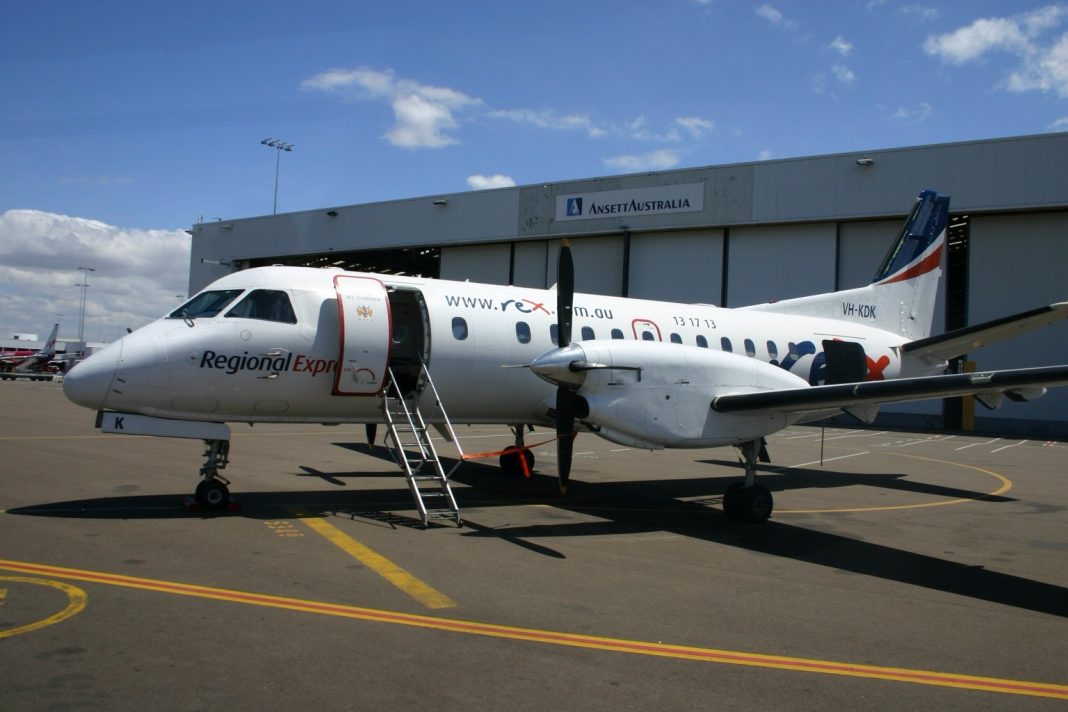Australia’s Regional Express (REX) has confirmed it intends to launch limited domestic jet operations next year. The airline first raised the possibility in May. Today, REX said it believed it could make a go of expanding and taking on the big airlines on Australia’s busiest trunk routes.
“It will simply be an incremental extension for REX to embark on domestic operations,” Rex’s Deputy Chairman, John Sharp said today.
A radical departure from REX’s established niche
REX has a fleet of Saab A340 turboprops. They keep busy flying to 60 regional and rural townships around Australia. The airline has a reputation for running on the smell of an oily rag but regularly squeezes out an annual profit.
Many attribute REX’s success to keeping it simple and sticking to its niche. But today’s decision is a radical departure from this.
REX wants to raise just over US$20 million. They say that’s all they need to launch “limited domestic operations.” REX plans to do this via either a sale-and-lease-back arrangement, equity injection, or convertible notes. The airline also says lessors are willing to provide $20 million against 15 of Rex’s unencumbered A340s. However, REX notes funding has not been finalized and is subject to shareholder approval.
What does REX have in mind?
The airline is eyeing a fleet of five to ten narrow-body jets based in Sydney and flying the usually lucrative “golden triangle” trunk routes between Melbourne, Sydney, and Brisbane. Qantas and Virgin Australia dominate these hotly contested routes.
Previous airlines have attempted to crack this market but failed. But REX argues its experience and lower cost base make the proposal feasible. John Sharp said;
“Leveraging on Rex’s existing infrastructure and overheads, our cost base for the domestic operation is estimated to be at least 35% below Virgin’s Australia’s (pre-COVID) with 50% lower additional headcount needed proportionately.”
REX plans to pitch its jet product at the middle market. Their fares will include a baggage allowance, meals onboard, and pre-assigned seating. Booking channels will include both Rex direct and Global Distribution Systems (GDS).
What REX does have in going in its favor is a feeder network of 1,500 weekly flights. Previously, they had an interline agreement with Virgin Australia. Passengers would fly into Sydney from a smaller town onboard REX, then move over to Virgin Australia for the trunk flight to Melbourne. Now, REX can funnel those passengers onto their planes.
A possible method to the madness
So there could be method in this madness. The airline has established infrastructure in Melbourne, Sydney, and Brisbane. While REX frequently comes across as a slightly loose, freewheeling operation prone to outlandish public statements, REX is an exceptionally well run airline steered by canny aviation professionals.
There is also the potential to harness the capacity vacuum caused by Virgin Australia’s collapse. That airline will be back, but it will be a smaller airline. Even local juggernaut airline Qantas says it will be a slimmer airline in the short to medium term. As demand begins to climb back to 2019 levels, REX could be well-positioned to ride that wave.
REX certainly thinks it can. Deputy Chairman, John Sharp said;
“We are the only carrier in Australia that has been able to navigate successfully the turmoil and shocks over the last two decades with uninterrupted operational profits since 2003.”
The anticipated start date for REX beginning jet operations is March 1, 2021.


